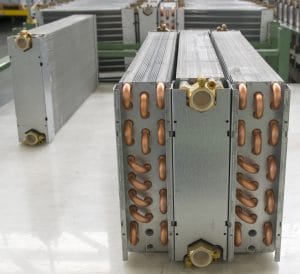 A lot has changed about electrical thermal management over the last few decades. Most importantly, the way in which companies approach it on an industrial level. With the advent of heat exchangers, companies that rely on technology and large equipment found a new, more affordable, and more efficient way than air conditioning to keep that equipment from overheating. They also began to realize that electrical thermal management is a much more versatile concept than they believed, which has led to increasingly more advancements in modern manufacturing technologies and techniques.
A lot has changed about electrical thermal management over the last few decades. Most importantly, the way in which companies approach it on an industrial level. With the advent of heat exchangers, companies that rely on technology and large equipment found a new, more affordable, and more efficient way than air conditioning to keep that equipment from overheating. They also began to realize that electrical thermal management is a much more versatile concept than they believed, which has led to increasingly more advancements in modern manufacturing technologies and techniques.
What is eco-friendly thermal management?
Before heat exchangers, thermal management meant pumping air-conditioned air into an electrical enclosure to counteract the waste heat that electrical components give off. Now, however, it most often means transferring heat in much more efficient and eco-friendly ways. For instance, heat exchangers use methods like natural/forced convection and phase-change cooling rather than Freon and complex machinery to keep enclosures cool.
Can below-ambient thermal management be more efficient?
While many heat exchangers effectively cool enclosures to just above the ambient temperature outside of them, some applications require cooling below this temperature. Rather than turn back to air conditioning, though, companies can achieve these temperatures with just as much efficiency and eco-friendliness. Below-ambient heat exchangers can be customized to meet any specific temperature and operating requirements, even in conditions that used to require the chilling effects of air conditioners.
What else can heat exchangers be used for?
Besides cooling electrical enclosures, heat exchangers have now become popular solutions for a variety of other thermal management needs. For instance, molding equipment can now utilize specialized heat exchangers known as thermal pins to improve the quality and yield time of molds. Also, wastewater treatment processes can benefit from heat exchangers providing the consistent temperature control needed to treat the water properly.
For more answers to questions about heat exchangers and modern thermal management, call Noren Thermal, Inc. in Taylor, TX, at 866-936-6736.







